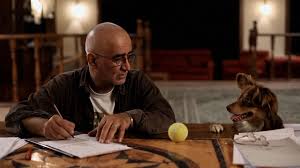Eye For Film >> Movies >> Closed Curtain (2013) Film Review
Closed Curtain
Reviewed by: Rebecca Naughten

Finally acquiring a UK release almost two years after screening at the 2013 London Film Festival, Closed Curtain was the second film made in secret by Jafar Panahi after he was placed under house arrest and banned from filmmaking for two decades in 2010 (a third film - Taxi Tehran - has screened at various festivals this year). Operating within those circumstances, Closed Curtain necessarily restricts itself to a limited space (Panahi's own villa overlooking the Caspian Sea) and draws attention to the lo-fi equipment at the director's disposal (the film utilises mobile phone footage shot by the characters).
The initial set-up makes optimum use of these production limitations. An unnamed writer (co-director Kambuzia Partovi) arrives at the coastal villa and immediately puts up blackout curtains in order to hide the fact that he is accompanied by his dog, Boy (who scampers off with the film). They are hiding from a canine cull imposed after the regime had declared pet dogs to be "impure". But their sanctuary is disturbed by the nighttime arrival of two siblings (Maryam Moqadam and Hadi Saeedi) fleeing a nearby police raid - when the man abruptly departs, leaving his apparently unstable sister in the writer's care, an uneasy tension develops and the confines of the set become increasingly claustrophobic.

The writer and Melika (Moqadam) are at loggerheads from the off with the woman purposely unsettling the older man with a series of insinuating comments that cause him to believe that she is a police spy. Throwing aside the usual niceties expected of houseguests, she mocks both his fear and any belief that his writing is important, and taunts him by saying that suicide is the only sensible route for someone in his position.
As their spiky conversations continue it becomes apparent that they are acting as a metaphor for Panahi's own depression and the conundrum with which he is faced - is he to live a life of fear, hidden away from the world, or continue trying to create (in secret), or instead succumb to suicidal fatalism? The curtain of the title plays into all three options - a veil of secrecy and a blocking out of the world, the theatricality of a closed curtain with the potential to open (emphasised by the low, wooden Japanese table that the writer often sits on with Boy - it looks like the boards of a stage), or the enforced darkness of a house in mourning.
The film tails off in the final third in part because the director seems (understandably) unsure of how to resolve this metaphorical (and meta-narrative) film, but there are also instances of dialogue that are too on the nose and clumsy in comparison to the subtler beginnings. It seems churlish to criticise Panahi's filmmaking given the circumstances in which the film was made - and actually in visual terms the filmmaking is more than proficient (one nice touch is that the writer is often shot in very shallow focus, neatly illustrating the blindness of fear - he (and we) cannot see beyond his immediate situation) - but the more problematic aspects of the film stem from a narrative that cannot sustain the inventiveness of the central conceit and which peters out before the end.
Closed Curtain feels like a minor work from a great director. But while it may not be a film of consequence it is nonetheless an example of filmmaking with consequences - in the aftermath of the film's screenplay winning the Silver Bear at the Berlin Film Festival (the film was smuggled out of Iran), Partovi and Moqadam had their passports confiscated by the Iranian authorities. The film is therefore worth watching in support of an artistic statement of intent and cognisant act of bravery on the part of its makers.
Reviewed on: 11 Sep 2015


















